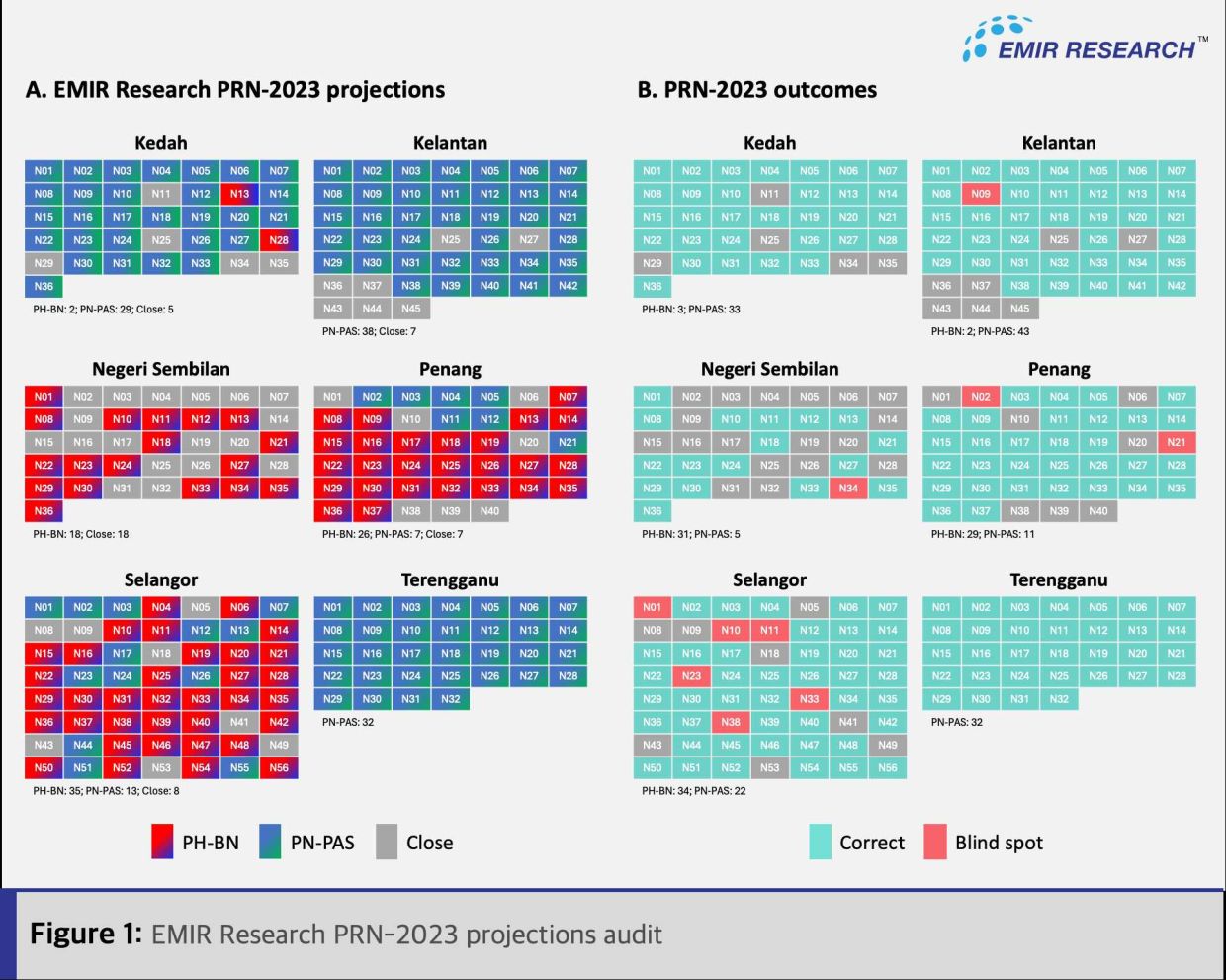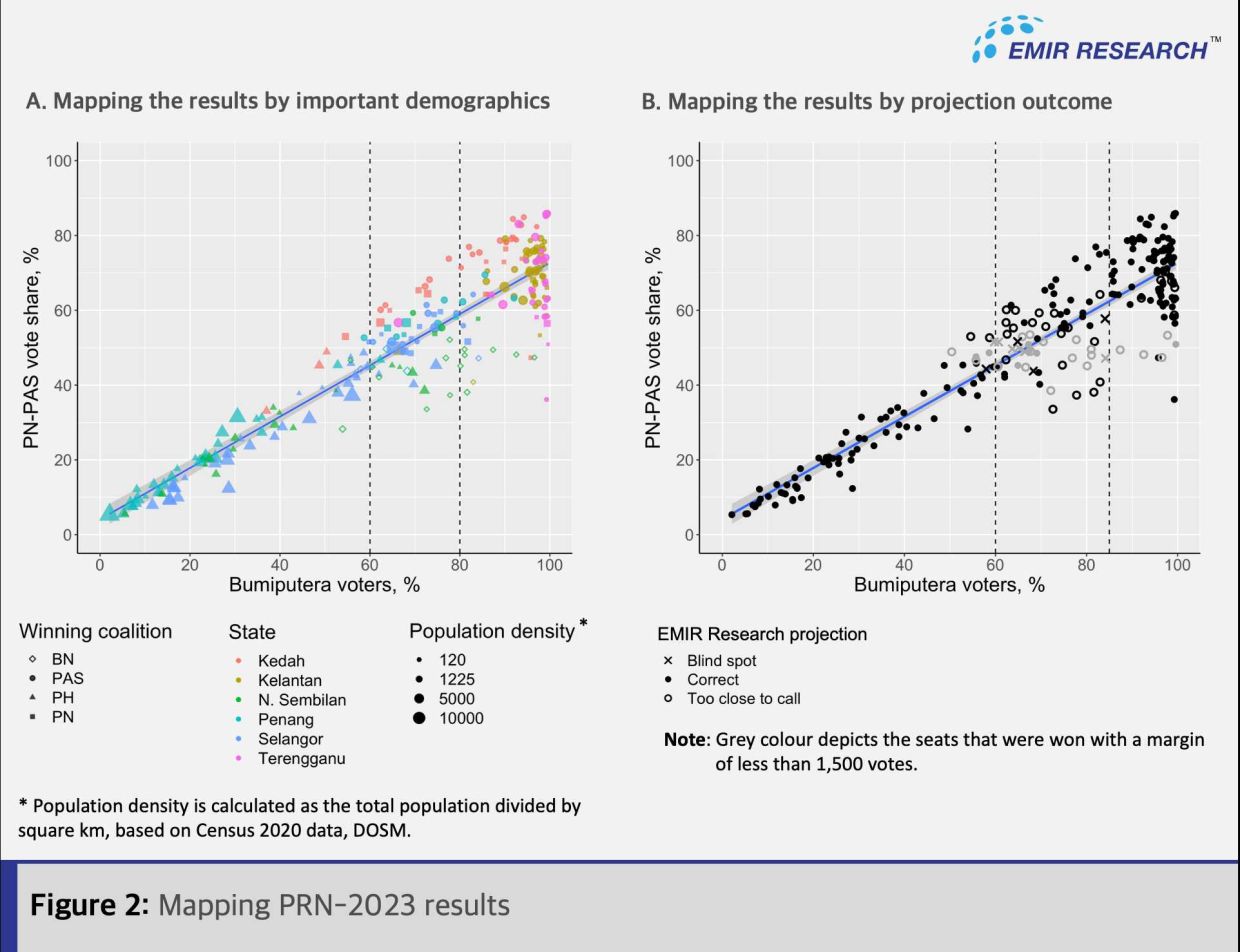ALTHOUGH the state elections in six states are over, some politicians on both sides are still using the results to push their own parochial and divisive narratives, possibly harming the nation more.
However, responsible leaders can and must learn from the outcome, while taking necessary corrective action towards rebuilding the country.
EMIR Research used historical state elections trend analysis, 15th General Election voting patterns, more recent poll aggregation and its ground survey data as inputs for its statistical models to generate its state polls projections. The analysis assumed that voting patterns could only shift slowly.
As a result of analysis, out of 245 contested seats, 45 emerged as too close to call (winning majority within +/- 1,500 votes) most of which were marginal wins. Out of the remaining 200 seats, only 10 turned out to be blind spots while the rest were accurately projected (Figure 1).
However, the fact that most win projections could have been modelled so well – especially along the ethnic differences – should be concerning.
Sadly, this means Malaysia remains as divided as ever (if not more so) when it needs unity the most due to the seriousness of its challenges given the geo-political and geo-economic situation.
This suggests Malaysia's political scene, including its leaders and voters, is not yet fully developed. Some leaders rely on identity politics of race and religion instead of creating effective policies.
At the same time, voters seldom consider the character and integrity of potential leaders or the country's issues. Too often, harmful and divisive rhetoric is accepted without thought, like a child eagerly taking candy.
Figure 2 illustrates the polarisation of Malaysian voters in the polls, with a clear divide based on ethnicity and urban-rural demographics. Pakatan Harapan was dominant in areas with less than 60% Malay population, particularly in highly urbanised regions. On the other hand, the PAS-led Perikatan Nasional coalition retained its power in areas with a higher percentage of Malays, especially 80% and above, but with a dispersed population (refer to Figure 2A for more details).
Seats with 60% to 80% Malay voters were difficult to see, resulting in narrow wins and most blind spots for EMIR Research (Figure 2B). Barisan Nasional also performed better in these seats, although mostly with a narrow margin.
The pattern of how the data points are spread around the trendline in Figure 2A also indicates that ethnic Malays living in areas with lower population density are still the most divided in terms of their party/coalition of choice, particularly where the Malays make up 60% to 80% of voters.
The ethnic demographic-based support for Perikatan followed a similar trend to that of GE15 (as shown in Figure 3A). However, there was a noticeable 10% increase in Perikatan vote share across the board – the parallel trendline shift in Figure 3A.
The opposite trend is true for Barisan since its electoral decline since GE12 (Figure 3B). Based on the distribution patterns in Figure 3, it appears that the transfer of votes from Barisan to Perikatan is almost complete, especially within communities where Malays make up the majority. This raises concerns about the current administration's ability to withstand the next general election.
Figure 4 visualises changes in the composition of seats after the recent state polls.
Once again, Figure 4 highlights the existential crisis faced by Umno. It has lost approximately two-thirds of its seats in six contested states compared to the previous state election – these seats are now almost equally shared between PAS and Bersatu.
A nearly identical dynamic is observed for Amanah – two-thirds of its seats are now shared by PAS and Bersatu.
PKR also lost slightly over one-third of its seats that, again, more or less equally were shared between PAS and Bersatu.
DAP is the only party within the unity government that maintained its base well.
Meanwhile, PAS – especially Bersatu – saw the most significant increase in their number of seats in the state polls compared to the previous election.
However, is this evidence of the so-called "green" or "blue" or "green-blue" wave? By no means should we over-interpret the patterns we observe in Figure 4, especially in the context of the whole of Malaysia.
For this reason, the state election cannot be viewed as a "referendum" on the current administration, even though certain quarters would like us to believe otherwise, just as they want now to convince everyone that the association with Pakatan is damaging for Barisan.
However, contrary to this narrative, the election data indicates that Barisan did not perform as poorly in the polls as we could expect in light of the electoral decline observed in Figure 3B above.
When we compare the Barisan vote share in GE15 to that in the state polls, we can observe a stark difference (Figure 5A), particularly in localities with a 60% to 80% Malay majority.
Of course, such a divergence of the trends could be due to various reasons. For example, unlike general elections, state elections might be more influenced by local issues and candidate factors.
Looking at the bigger picture of the Pakatan-Barisan coalition vote share trend in the polls (as shown in Figure 5B), it becomes evident that Barisan's vote share mostly followed this trend.
This suggests that the association with Pakatan likely gave Barisan an unexpected boost or that there was indeed some transfer of votes, particularly in areas where Malays make up 60% to 80% of the population.
Therefore, if anything else, Pakatan-Barisan now needs more constructive integration as it benefits both.
PAS, unsurprisingly, is once again expressing its willingness to collaborate with Barisan, but not with pro-DAP leaders, in an obvious effort to divide and destabilise the unity government. This aligns with their past strategy of forming alliances for personal gain (refer to "PAS politics – sleeping with all strategy").
However, Umno must understand that their market is similar to PAS and Bersatu, and therefore, they will be further weakened – down the pecking order in ranks, while in unity government, they yield a better rank. Losing so many seats in the polls does not help the case either. Anti-party hopping laws also discourage MPs or state assemblymen from crossing over as they lose their seats if they do, and re-contest under the current wave is not a guarantee!
The current status quo provides much-needed "time" for Umno to reinvent itself and for the unity government to focus on important deliverables.
Perikatan's simple narrative that worked well in GE15 that they are like Umno but not corrupt, would now be difficult to sell, especially among educated Malays, unless they can explain involvement in corruption cases by their leaders.
Therefore, Umno must take the hint. Umno president Dato Seri Ahmad Zahid Hamidi knows what he must do to ensure Umno doesn't slide any further. Great statesmen must think about trans-generational pathways of the people, sometime monumental personal sacrifice needs to be done for the greater good of his people, party and nation. Umno should consider bringing back valuable assets like Khairy Jamaluddin and Shahril Sufian Hamdan and empowering individuals like Datuk Seri Dr Zambry Abdul Kadir and Datuk Dr Ashraf Wajdi Dusuki.
The unity government must do an immediate independent and competent post-mortem to address Malay concerns, reiterating that their rights are preserved in line with Articles 3, 152 and 153 of the Federal Constitution while also upholding the position and roles of our constitutional monarchs. The findings must be communicated to all levels of society, especially the Malays, to allay their never-ending fear, possibly the only majority that is perpetually fearful of the minority in the world. This is mostly accentuated by politicians who practice high-intensity identity politics that divide rather than unify.
The government must focus its efforts on reducing the people's burden by implementing programs that will help the people holistically – reducing the pressure of price increases; increasing affordable housing; increasing allocations for affordable public health and education programs; and adding programs that lead to quality jobs with dignified wages.
The current administration is already working on delivering along these lines. However, they need to do more. They need to do it faster and they need to do better.
They must communicate it better by addressing urban, rural, youths, etc., while employing the right social media strategy. The unity government needs a powerful communications team addressing urban, rural, youths, etc., employing the right social media strategy – balancing rational and emotional appeal. Tell them what the unity government is doing and how it will benefit them! Strategic communication of the unity government needs to be on steroids because, so far, Perikatan outnumbers them by 10:1 by TikTok content alone.
The unity government also needs to speed up its efforts on the path of radical transparency, the rule of law, and holistically fighting the evil of corruption:
– Reform the Malaysian Anti-Corruption Commission (MACC).
– Resolve major scandals such as Digital Nasional Berhad (5G issue), foreign labour issue, Felda and so on – the establishment of a truth, recovery and amnesty commission to recover at least 80% of the amount of money and property that has been embezzled by politicians, businessmen, the public sector or the private sector (refer to "Malaysia's RM4.5 trillion losses to corruption & leakages — It is time to TRAC").
– Separate the office of the Attorney General from the Public Prosecutor.
– Restore the authority of judicial institutions that carry out judicial work independently.
– Restore the authority of parliamentary institutions.
– Create a political funding mechanism with integrity.
– Make the governance of all government-owned companies (GLC) at par with international standards. Singapore and Norway have good models of governance.
– Increase the transparency and integrity of the budget and the budget process – institutionalise the input-output-outcome-impact-based (IOOI) approach (refer to "Recalibrating national budget – eradicating leakages and corruption").
The unity government must continue to promote fair and equitable economic growth while building an inclusive, moderate and glorious Malaysia on the world stage:
– Advance the economy of bumiputra and all Malaysians.
– Stimulate investment and simplify business and trade processes.
– Introducing a people-friendly and business-friendly taxation system.
– Make government schools the best choice for the people.
– Create the best, balanced and relevant curriculum.
– Manage the problem of "brain drain" that leads to the loss of "human capital" that is so needed.
– Restore the authority of public universities and higher education.
– Empowering social institutions, civil society and social entrepreneurship.
– Make Malaysia a country known for its integrity, not for its corruption.
– Defending national borders from invasion, smuggling and human trafficking.
– Dignify Malaysia's role in international institutions.
The elections are over. It is time to stop divisive rhetoric and focus on delivering to the people.
Dr Rais Hussin is the CEO of EMIR Research, an independent think tank focused on strategic policy recommendations based on rigorous research.
The views expressed here are the author's own







